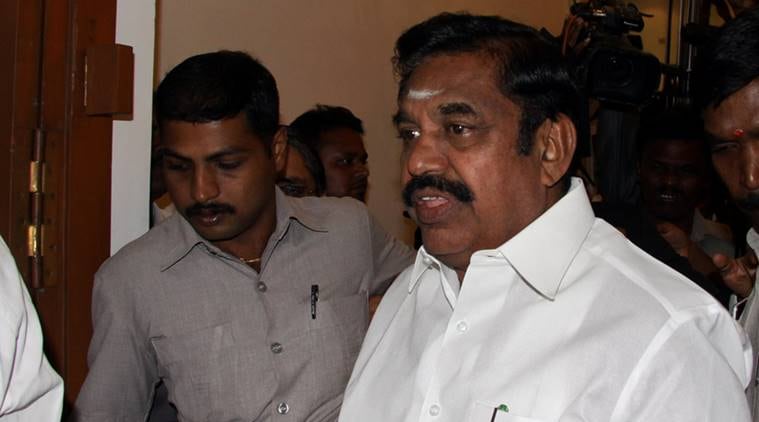 Chief Minister Edappadi K Palaniswamy (Reuters/Representational Image)
Chief Minister Edappadi K Palaniswamy (Reuters/Representational Image)
The conclave is a significant first step towards building such a cooperative working group. But, it needs to become a continuous and permanent arrangement. By not sending ministerial representatives, the governments of Telangana and Tamil Nadu have risked being left out. Hopefully, along with other states, Telangana and Tamil Nadu will be a part of the follow-up meeting slated to be held next month in Visakhapatnam. At that meeting, the states must come together and form a southern caucus and delineate a common minimum political and economic agenda.
The political aspects may include aspects challenging Centre’s actions on the imposition of Hindi or on beef whereas the economic agenda should call for a review of the 15th Finance Commission’s Terms of Reference and formula for the devolution of funds. Together, this southern caucus would account for over 10 per cent votes in the GST Council and 121 Lok Sabha seats. But, their collective voice is bound to find resonance with other states, which feel hard done by the changes in the terms of reference in the 15th Finance Commission.
The idea of a common Dravidian destiny has a long history. In his maiden speech at the Rajya Sabha in 1962, C N Annadurai, the founder-leader of the Dravida Munnetra Kazhagam (DMK), had pleaded the case for “Dravida Nadu”. He said “it will become a small nation, compact, homogenous and united, wherein sections of people in the whole area can have a community of sentiment”. He also spoke about the possibility of making “economic regeneration more effective and social regeneration more fruitful” if such a separate nation was to be carved out of the Union of India.
The arguments of Anna were a culmination of a 25-year-long campaign. Nambi Arooran, in his study, Tamil Renaissance and Dravidian Nationalism, identifies the first anti-Hindi imposition struggle (1937-1940) as the event that aroused the separatist tendencies in Madras Presidency. The Justice Party’s 17-year-long reign in the Madras Presidency had ended in 1936 and the Congress government that followed made Hindi compulsory in schools.
During the protests that ensued, Periyar E V Ramasamy was jailed and during his imprisonment, he was invited to lead the Justice Party. Merging his Self-Respect League with the Justice Party and bolstered by the Muslim League’s advocacy for Pakistan, Periyar started campaigning for a separate Dravida Nadu.
In 1944, the Justice Party was renamed Dravidar Kazhagam and the secessionist voices grew louder. The resultant subnationalist movement, aided by a rediscovery of Dravidian linguistic and cultural heritage, took shape parallel to the Indian independence struggle. Ultimately, the predominant enthusiasm for secession was centred in the Tamil-speaking region of Madras Presidency. In the first years of independence, the reorganisation of states along linguistic lines reduced the momentum for secession. Finally, in October 1963, the 16th amendment to the Constitution — also referred to as the “anti-DMK Bill” was passed in Parliament — which made it obligatory for elected representatives to swear allegiance to the nation and restricted the freedom of speech and expression to include anything said against the “sovereignty and integrity of the nation”.
The DMK general council meeting in June 1963 condemned the Centre for curtailing free speech and for attempting to establish a “one party dictatorship”. However, after deliberations led by the Era Chezhian committee, the party’s executive committee, in November 1963, amended its demand for “Dravida Nadu” to enabling a “Dravidian Cooperation” — of the four states of Karnataka, Andhra Pradesh, Kerala and Tamil Nadu — to work within the constitutional framework and ensure maximum devolution of powers to the states. It is possible that the Congress leadership expected the 16th Constitution amendment to shear the DMK of its ideological mainstay and, consequently, implode.
However, the opposite happened. Buoyed by the anti-Hindi imposition protests in 1965, the DMK swept to power in what was then known as Madras State. Denied Dravida Nadu, the DMK gained Tamil Nadu in the 1967 election.
While speaking about Dravida Nadu, Anna explained that though the demand for a separate nation was being conceded, the grounds for such a demand continued to exist. Even today, more than half century later, the central government is glaringly indifferent to legitimate regional concerns. Over the past year, a combination of the National Eligibility cum Entrance Test (NEET), the Goods and Services Tax and 15th Finance Commission have triggered a sense of unease in the five southern states.
The federal harmony has further dipped due to motivated restrictions on cattle sale, uncharitable remarks about Periyar and ill-advised advancement of Hindi over other languages. Today, we are staring at a real and deepening North-South divide.
The writer is an advocate and spokesperson of the DMK.
- Follow the money
Asset recovery is more important than finding and arresting the bank scam accused ..
- India or Hindia?
Question posed by DMK president Karunanidhi acquires renewed urgency..
- Can 2G ‘scam’ architects BJP & ADMK speak with authority now?
Take Kanimozhi. Her son was 11 years old when she the case started, she had to be in Delhi for day-to-day trial over the last…
